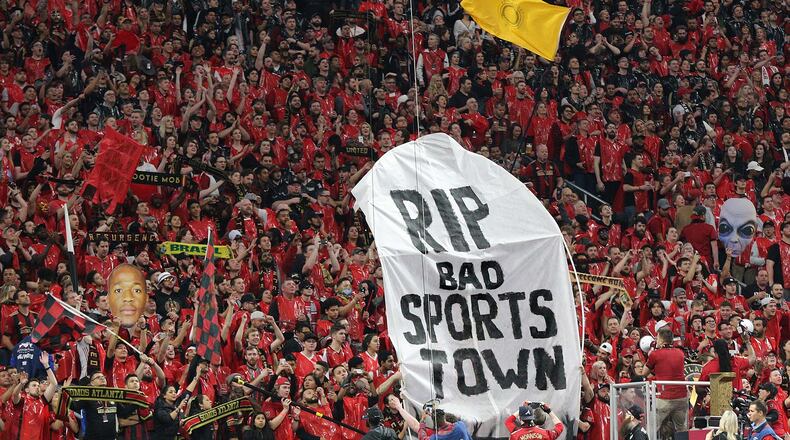The chief organizer of the bid that secured the 2026 World Cup for North America offered an encouraging assessment Wednesday of Atlanta's chances of hosting key parts of the event — and a sobering assessment of the costs of doing so.
John Kristick, who was executive director of the joint bid committee for the United States, Mexico and Canada, spoke during a day-long sports business conference at SunTrust Park.
“I think Atlanta is in a very good position (to host World Cup matches),” Kristick said. “Your fundamentals are good. There are other cities … who can consider themselves more underdogs. I don’t think sitting here today Atlanta should see themselves as an underdog. They just have to be really smart in their approach.”
Kristick noted that the North American bid recommended Atlanta and Dallas as potential hosts of one World Cup semifinal each, plus five or six earlier matches during the event. Atlanta and Dallas also were suggested in the bid as options to host the event’s international broadcast center.
Those recommendations aren’t binding on FIFA, soccer’s global governing body, which is expected to finalize the U.S. site choices for 2026 by late next year or early 2021.
As for the expected host city costs, Kristick estimated those in a hefty range of $30 million to $80 million, depending on the number and level of games hosted and the expensiveness of a particular city. By comparison, the Atlanta host committee’s budget for Super Bowl LIII pegged the local cost of that event at $46 million.
Kristick’s estimate of World Cup costs included $16 million to $42 million per host city for safety and security, $12 million to $20 million per city for traffic and transportation, $2 million to $4 million per city for marketing and beautification and $1.5 million per city for a fan festival.
A portion of the Atlanta hotel-motel tax designated for bringing major events to the city covered $16 million of the cost of hosting the Super Bowl in February and will cover $8.5 million of the cost of hosting next year’s Final Four. To host the World Cup and other major sports events in the future, local sports and tourism officials hope to secure an additional public funding source.
“The challenge moving ahead is that costs are continuing to rise,” Atlanta Convention and Visitors Bureau president and CEO William Pate said at Wednesday’s event, hosted by the Metro Atlanta Chamber and the Atlanta Sports Council. “We need a companion financial piece to work with the (hotel-motel tax) so we can fund these opportunities.”
That issue is expected to come up in next year’s session of the Georgia Legislature.
Sports Council president Dan Corso said the combination of the hotel-motel tax and the business community “has done us very well” in funding past events, but “in the case of the World Cup and beyond we’re going to need an additional source, either new or expanded.”
While Kristick cited $80 million as the high end of a city’s cost range, Corso said he’d heard it might be $50 million in Atlanta, “which would put it kind of on par with the Super Bowl.”
“That is a workable number,” Corso said. “It is a large number.”
Georgia Gov. Brian Kemp, who spoke at Wednesday’s conference, said the success of Super Bowl LIII here “has made me very excited about our World Cup opportunity.”
“I had a great meeting the other day with (Corso), talking about that,” Kemp said. “He said, ‘It’s going to take a lot of money for security.’ Which we know that.
“But it is an opportunity for us to be on a stage ... in some ways even more so than the Super Bowl, certainly for a longer period of time,” Kemp said.
When FIFA awarded the 2026 World Cup to the United States, Mexico and Canada last year, the organization said at least 16 cities in the three countries eventually would be chosen to host matches. At least 10 U.S. cities will be selected, along with three cities in Mexico and three in Canada. Seventeen U.S. cities, including Atlanta, were named as candidates for this country’s 10 spots.
“The next steps are waiting for FIFA and U.S. Soccer to re-engage with the cities (in the coming weeks or months),” Kristick said.
Atlanta’s advantages, Kristick said, include the newness and large seating capacity of Mercedes-Benz Stadium and a “strong soccer story line” with the success of Atlanta United.
About the Author
Keep Reading
The Latest
Featured

